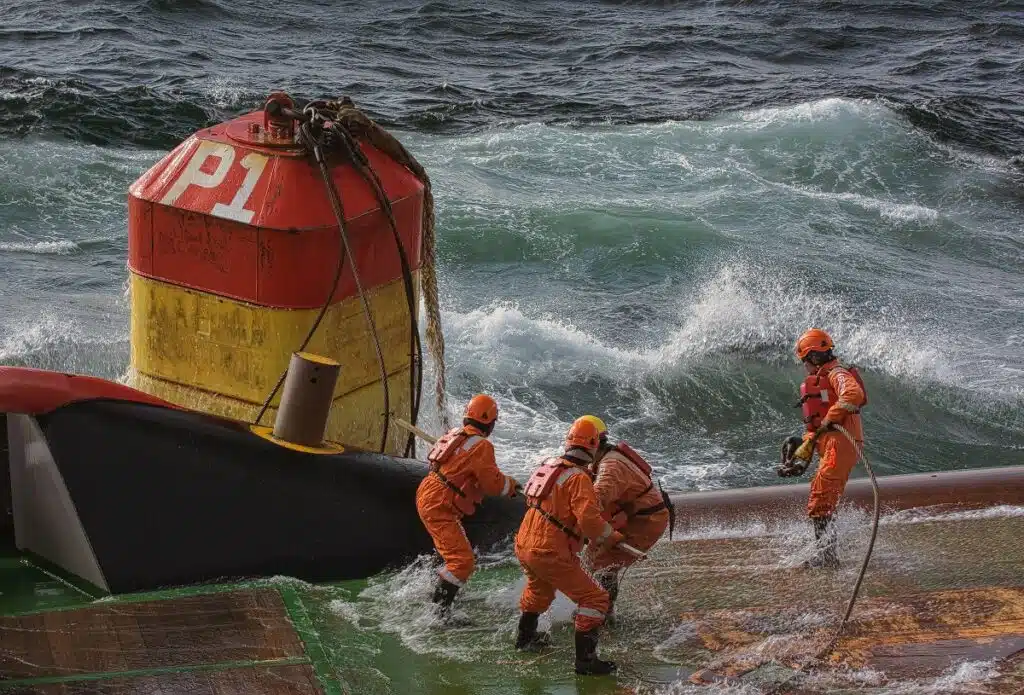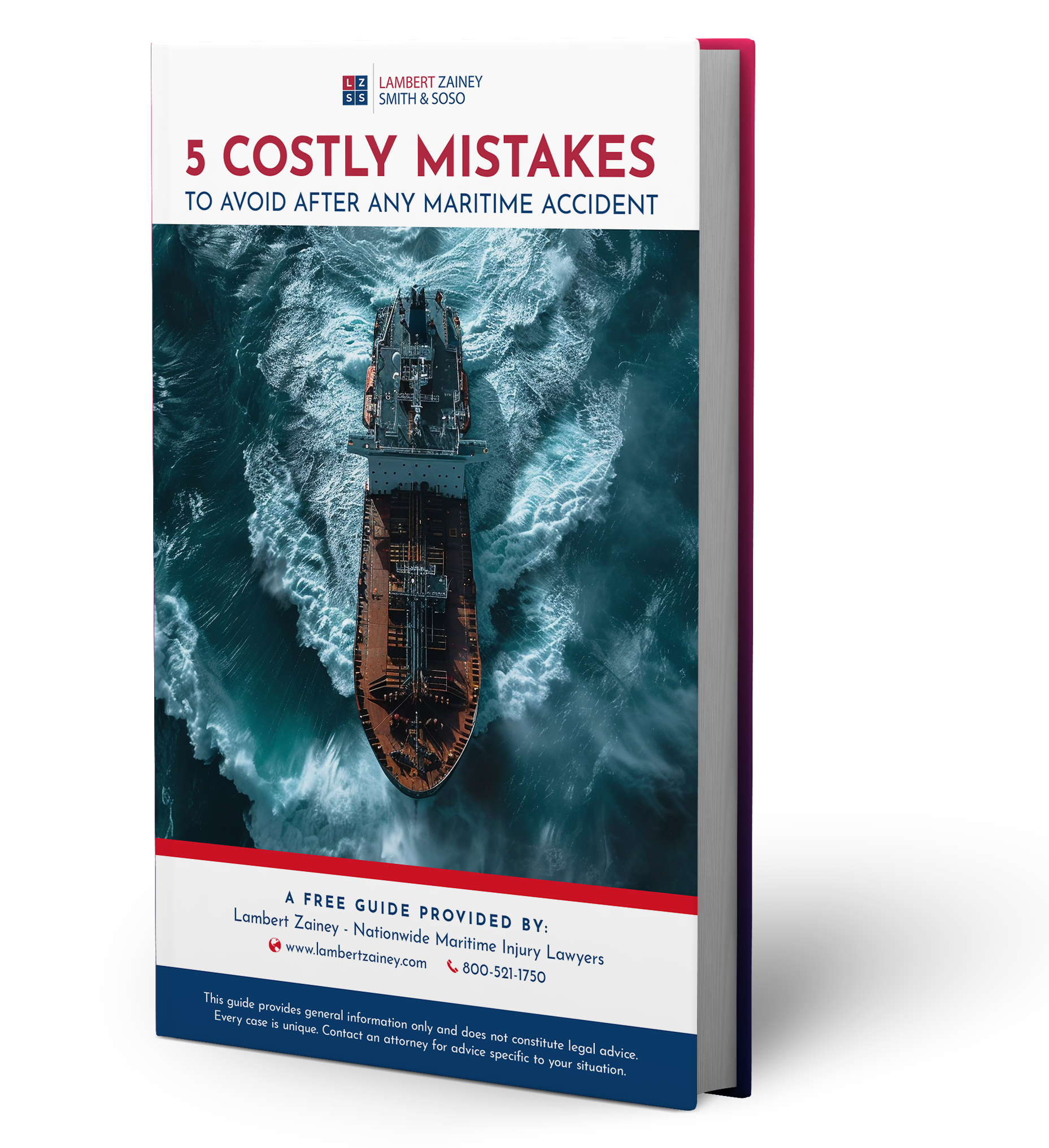The idea of working on the water can seem adventurous, but for the hardworking men and women of the maritime industry, it’s often a tough and dangerous reality. Long hours, heavy machinery, unpredictable weather and the unforgiving nature of the sea create a high-risk environment. While safety has improved over the years, many maritime jobs remain among the most hazardous in the world.
At Lambert Zainey, we have spent over 40 years representing injured maritime workers. We understand these jobs because we know the people who do them. Here’s a look at some of the most dangerous jobs in the industry and the risks workers face every day.
Commercial Fisherman

Often cited as one of the most dangerous professions in America, commercial fishing combines long hours of strenuous physical labor with the unpredictability of the open ocean.
Key Dangers:
Crew members on fishing vessels are typically protected as seamen. Learn more about your rights on our Jones Act Claims Page.
Deckhand (Tugboats, Push Boats & Barges)
Working on the inland waterways or in harbors as a deckhand is physically demanding and exposes workers to constant risk, especially when handling tow lines and moving between vessels.
Key Dangers:
These river and canal workers face unique hazards. See how we handle these cases on our Inland Waterway & River Accidents Page.
Offshore Rig Worker (Roustabout, Roughneck, Derrickman)
Working on an offshore oil and gas rig in the Gulf of Mexico means being surrounded by heavy machinery, high-pressure systems and flammable materials, all while isolated far from land.
Key Dangers:
Injuries on offshore rigs involve complex laws. Learn more on our Offshore Injury Lawyers Page.
Longshoreman & Harbor Worker
While they may work on the docks, longshoremen and other harbor workers are constantly exposed to the dangers of moving massive cargo and heavy equipment around vessels and in shipyards.
Key Dangers:
Dockworkers are protected by a specific federal law. Explore your rights on our LHWCA Claims Page.
Knowing Your Rights After an Injury
The reason special maritime laws exist is because this work is so dangerous. If you’ve been injured in one of these jobs — or any other maritime profession — you have powerful legal rights that are different from typical onshore workers. Depending on your job and where you were hurt, you may be entitled to compensation under:
Employers and their insurers often look for ways to deny responsibility after a serious accident, including relying on results from post-accident drug or alcohol tests to argue that impairment, not unsafe working conditions, caused the injury. While this can complicate a maritime injury claim, it does not automatically eliminate your right to compensation if negligence or unseaworthiness played any role in the accident.
Navigating these laws to get fair compensation for medical bills, lost wages, and your pain and suffering requires an experienced maritime lawyer.
Get Our FREE Guide to Protect Your Claim
What you do after an accident is critical. Insurance companies will try to get you to make mistakes that can hurt your claim. Our free guide can help you avoid these traps.
Download our complimentary guide: “5 Costly Mistakes to Avoid After Any Maritime Accident” to arm yourself with the knowledge you need to protect your rights.
Hurt in a Dangerous Maritime Job? Talk to Us.
The team at Lambert Zainey has been fighting for injured maritime workers for over 40 years. We know the jobs, we know the dangers, and we know the law.
If you were injured at sea, on the river, or in a port, contact us today for a free, confidential consultation. We’ll listen to your story, explain your rights, and tell you how we can help.
Call Us 24/7: 800-521-1750 📞
Or Fill Out Our Secure Online Contact Form
The idea of working on the water can seem adventurous, but for the hardworking men and women of the maritime industry, it’s often a tough and dangerous reality. Long hours, heavy machinery, unpredictable weather and the unforgiving nature of the sea create a high-risk environment. While safety has improved over the years, many maritime jobs remain among the most hazardous in the world.
At Lambert Zainey, we have spent over 40 years representing injured maritime workers. We understand these jobs because we know the people who do them. Here’s a look at some of the most dangerous jobs in the industry and the risks workers face every day.
Commercial Fisherman

Often cited as one of the most dangerous professions in America, commercial fishing combines long hours of strenuous physical labor with the unpredictability of the open ocean.
Key Dangers:
Crew members on fishing vessels are typically protected as seamen. Learn more about your rights on our Jones Act Claims Page.
Deckhand (Tugboats, Push Boats & Barges)
Working on the inland waterways or in harbors as a deckhand is physically demanding and exposes workers to constant risk, especially when handling tow lines and moving between vessels.
Key Dangers:
These river and canal workers face unique hazards. See how we handle these cases on our Inland Waterway & River Accidents Page.
Offshore Rig Worker (Roustabout, Roughneck, Derrickman)
Working on an offshore oil and gas rig in the Gulf of Mexico means being surrounded by heavy machinery, high-pressure systems and flammable materials, all while isolated far from land.
Key Dangers:
Injuries on offshore rigs involve complex laws. Learn more on our Offshore Injury Lawyers Page.
Longshoreman & Harbor Worker
While they may work on the docks, longshoremen and other harbor workers are constantly exposed to the dangers of moving massive cargo and heavy equipment around vessels and in shipyards.
Key Dangers:
Dockworkers are protected by a specific federal law. Explore your rights on our LHWCA Claims Page.
Knowing Your Rights After an Injury
The reason special maritime laws exist is because this work is so dangerous. If you’ve been injured in one of these jobs — or any other maritime profession — you have powerful legal rights that are different from typical onshore workers. Depending on your job and where you were hurt, you may be entitled to compensation under:
Employers and their insurers often look for ways to deny responsibility after a serious accident, including relying on results from post-accident drug or alcohol tests to argue that impairment, not unsafe working conditions, caused the injury. While this can complicate a maritime injury claim, it does not automatically eliminate your right to compensation if negligence or unseaworthiness played any role in the accident.
Navigating these laws to get fair compensation for medical bills, lost wages, and your pain and suffering requires an experienced maritime lawyer.
Get Our FREE Guide to Protect Your Claim
What you do after an accident is critical. Insurance companies will try to get you to make mistakes that can hurt your claim. Our free guide can help you avoid these traps.
Download our complimentary guide: “5 Costly Mistakes to Avoid After Any Maritime Accident” to arm yourself with the knowledge you need to protect your rights.
Hurt in a Dangerous Maritime Job? Talk to Us.
The team at Lambert Zainey has been fighting for injured maritime workers for over 40 years. We know the jobs, we know the dangers, and we know the law.
If you were injured at sea, on the river, or in a port, contact us today for a free, confidential consultation. We’ll listen to your story, explain your rights, and tell you how we can help.
Call Us 24/7: 800-521-1750 📞
Or Fill Out Our Secure Online Contact Form









